When managing your digital security becomes overwhelming, password managers like 1Password vs Enpass offer compelling solutions to keep your sensitive information protected. Both platforms emerged as trusted options, with Enpass Technologies Private Limited starting in 2011 with a focus on user privacy first, while 1Password has established itself as a leading password manager providing secure storage and comprehensive online security.
If you’re comparing 1Password vs Enpass, you’ll find both utilize robust AES-256 encryption to safeguard your data. However, they differ significantly in their approaches. 1Password distinguishes itself through advanced security measures including a unique secret key for extra protection and specialized tools like Travel Mode. Meanwhile, Enpass appeals to the budget-conscious with its offline capabilities, competitive pricing, and flexibility to store your data locally on your devices or sync through your personal cloud storage. Furthermore, Enpass offers both a monthly subscription and a one-time purchase option, while 1Password operates on a subscription model.
Choosing between these two password managers ultimately depends on your specific needs and preferences. Throughout this article, we’ll examine their security architectures, core features, platform compatibility, pricing structures, and customer support to help you determine which option provides better value for your investment in 2025.
Security Architecture: Encryption, MFA, and Privacy
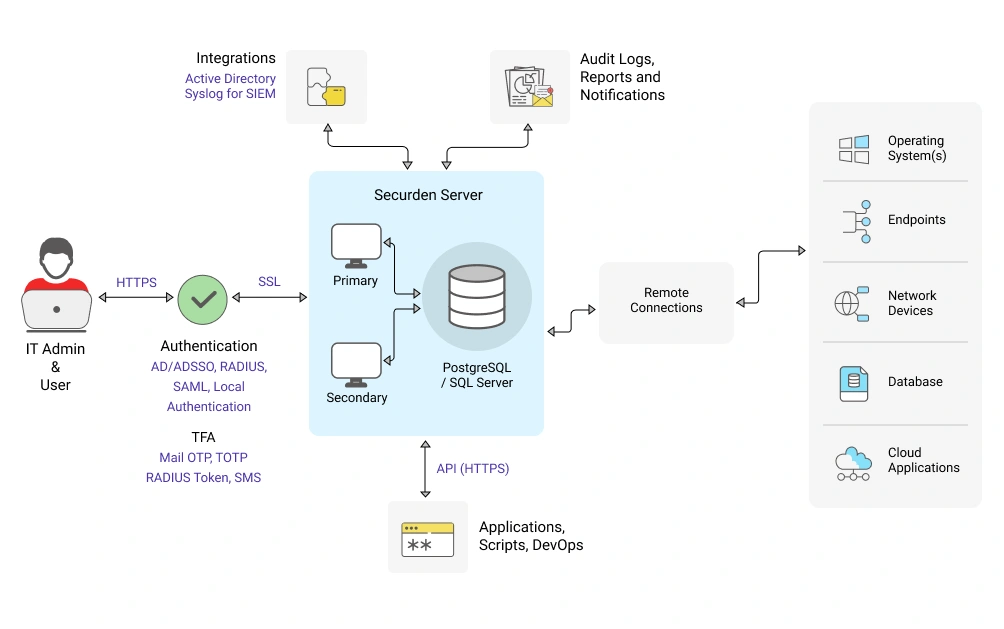
Image Source: Securden
Security serves as the foundation upon which any effective password manager stands. Both 1Password and Enpass prioritize protecting your sensitive data, yet their approaches differ in several key aspects.
Encryption Protocols: AES-256 with PBKDF2 vs AES-256 with Secret Key
The security backbone of both password managers relies on industry-standard 256-bit AES encryption. 1Password implements AES-GCM-256 encryption coupled with PBKDF2 password hashing to guard your master password. Additionally, 1Password employs a unique dual-key security model that combines your master password with a 128-bit Secret Key. This Secret Key never leaves your device, ensuring that even if someone obtains your password, they still cannot decrypt your data without this second key.
Enpass, in contrast, uses 256-bit AES encryption with 100,000 rounds of PBKDF2-HMAC-SHA512 via SQLCipher. This approach helps shield your data from sophisticated attacks like brute force and side-channel attempts.
Multi-Factor Authentication: 1Password’s Duo Support vs Enpass KeyFile
1Password offers robust multi-factor authentication options, integrating with authenticator apps such as Authy, Google Authenticator, and Microsoft Authenticator. Moreover, you can utilize Duo Security to receive push notifications on your mobile device for login confirmation.
Enpass takes a different route by not supporting traditional MFA. Instead, Enpass provides a KeyFile feature—a file containing an encryption key used alongside your master password. Though this adds a security layer, it might be less intuitive for non-technical users compared to standard MFA implementations.
Zero-Knowledge Architecture: How Both Handle Data Privacy
Both password managers employ zero-knowledge architecture, meaning they cannot access your stored data. With 1Password, three elements are required to decrypt your information: your account password, your Secret Key, and the encrypted vault data. Only the encrypted vault resides on 1Password’s servers.
Enpass emphasizes privacy through its offline-first approach, storing all information locally on your device. This strategy enhances security by keeping data off the internet, effectively reducing online attack risks.
Third-Party Audits: SOC 2 Type 2 vs Cure53 Reports
1Password maintains a strong security validation record with SOC 2 Type 2 certification, verifying adherence to strict security, availability, processing integrity, confidentiality, and privacy standards. The company also holds ISO 27001:2022, 27017:2015, 27018:2019, and 27701:2019 certifications, confirming compliance with international security and privacy standards.
Conversely, Enpass has undergone third-party audits by Cure53, although these assessments appear less comprehensive compared to 1Password’s extensive security validations.
Beyond audits, 1Password operates a public bug bounty program through HackerOne, encouraging security researchers to identify potential vulnerabilities. This proactive approach demonstrates their commitment to maintaining robust security measures.
Core Features Compared: Password Generation, Sharing, and Recovery
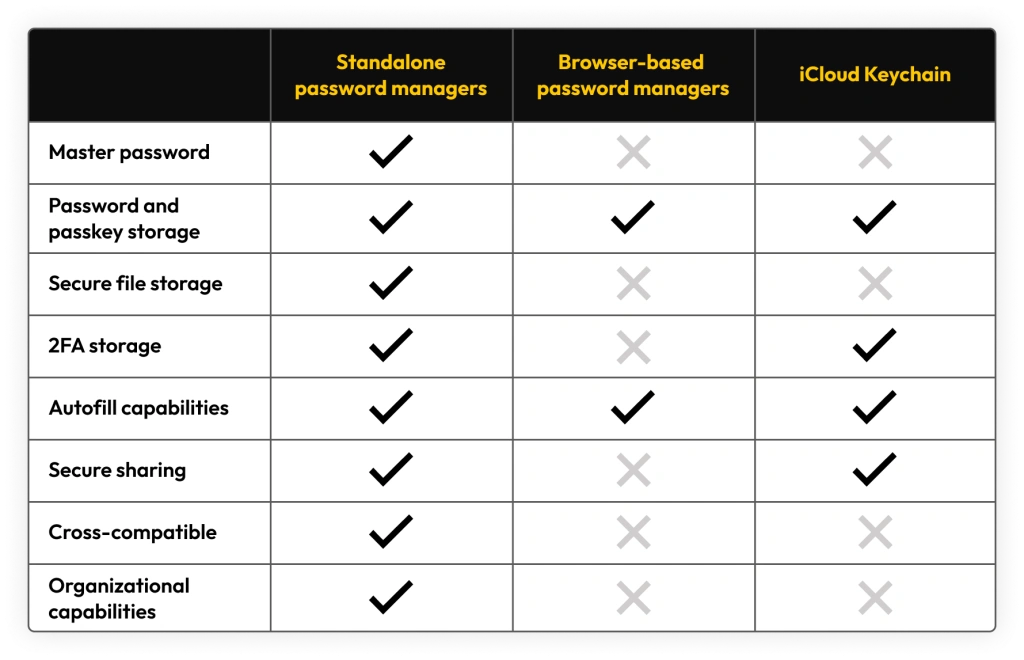
Image Source: Keeper Security
Beyond encryption standards, the essential day-to-day features differentiate password managers and determine their practicality for users.
Password Generator Customization: Passphrases vs Random Strings
Both 1Password and Enpass excel at password generation, a critical function for creating strong, unique credentials. 1Password’s Strong Password Generator creates random passwords, passphrases, and PINs with extensive customization options for length, capitalization, and character types. Similarly, Enpass offers robust generation tools with options to create both random strings and passphrases, allowing adjustments for length, capitalization, and special characters. The generators from both providers earn top marks for usability and effectiveness.
Password Sharing: Secure Link vs Pre-Shared Key
For sharing credentials with others, 1Password allows users to share items via unique links that can be sent through email or messaging platforms. You can specify exactly who can access the shared item and set expiration parameters ranging from 30 days down to a single view. Family and business subscribers gain additional capabilities through shared vaults with granular permission controls.
Enpass, alternatively, employs pre-shared keys (PSK) – specific passwords known only to you and recipients. Nevertheless, this approach has a significant drawback: your data is transmitted in plaintext format, creating potential security vulnerabilities despite the PSK’s presence.
Account Recovery: Emergency Kit vs No Recovery Option
1Password provides a comprehensive recovery solution through its Emergency Kit – a PDF document containing your account details and a place to record your master password. The company recommends printing copies, saving digital versions to personal cloud storage, and potentially sharing with trusted contacts.
Conversely, Enpass takes a zero-tolerance stance toward forgotten passwords. Without recovery options, losing your master password means permanently losing access to all stored data.
Multiple Vaults and Access Control
Both password managers support organizational features through multiple vaults. 1Password delivers seamless vault management, allowing separate containers for work, personal, and shared passwords. Business users benefit from detailed permissions: viewing, creating, editing, archiving, and deleting items.
Enpass supports multiple vaults as well but relies primarily on local storage or third-party cloud services for synchronization.
Travel Mode and Watchtower: 1Password’s Advanced Tools
1Password distinguishes itself with two unique security features absent from Enpass. Travel Mode allows temporarily removing sensitive information from devices before crossing borders or entering high-security areas, with easy restoration afterward. Watchtower continuously monitors your saved passwords against known data breaches, alerting you to compromised credentials that require immediate updating.
Platform Compatibility and User Experience
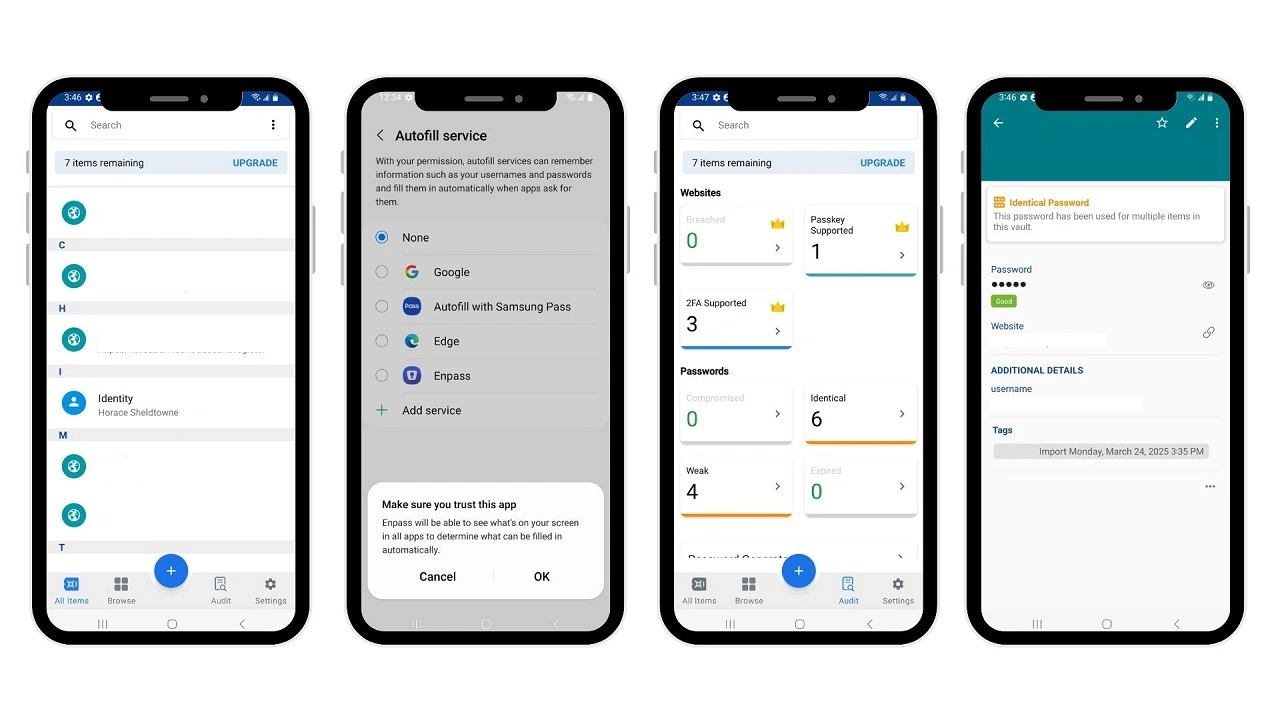
Image Source: PCMag Middle East
The user experience often determines whether a password manager becomes an essential tool or an abandoned experiment. Both 1Password and Enpass offer cross-platform support, yet differ distinctly in their interface design and synchronization methods.
Desktop App Design: Clean UI vs Functional Layout
1Password‘s desktop application features a visually appealing interface with clear categorization of items into folders like All Items, Favorites, Login, Card, Identity, and Secure Note, making navigation straightforward. The modern design prioritizes esthetics alongside functionality.
Enpass, alternatively, presents a more utilitarian approach with smaller fonts and icons. Its simple, minimalist user interface divides the main dashboard into different categories for credentials, credit cards, and passwords. The layout includes tabs for audit features, breach monitoring, and password health sections.
Mobile App Limitations: Free Tier Restrictions in Enpass
A significant limitation exists in Enpass’s free mobile version—users are restricted to just 25 items on Android and iOS devices. Essentially, if you exceed this limit, you’ll need to upgrade to a premium subscription to access all your passwords on mobile devices. This constraint doesn’t affect desktop users, as Enpass offers unlimited storage on Windows, macOS, and Linux platforms.
1Password’s mobile apps, fortunately, maintain feature parity with their desktop counterparts, providing all essential functions including autofill in applications.
Browser Extensions: Autofill Flow and Integration
Regarding browser support, both password managers cover major browsers including Chrome, Firefox, Safari, and Edge. Particularly, 1Password additionally supports Brave, whereas Enpass offers Vivaldi integration instead.
1Password’s browser extension provides comprehensive functionality with seamless desktop app integration. In contrast, Enpass takes a minimalist approach—primarily offering autofill capabilities. Notably, Enpass requires its desktop application to be running simultaneously for autofill functionality, creating additional steps for users.
Cross-Platform Sync: Cloud vs Local Storage
Perhaps the most fundamental difference between these services lies in their synchronization approaches. 1Password operates as a cloud-based service, storing passwords in a secure online vault. This provides immediate access across all authorized devices.
Enpass, correspondingly, offers greater flexibility through three distinct options:
- Local storage directly on devices (completely offline)
- Personal cloud storage via services like Dropbox, Google Drive, or OneDrive
- Wi-Fi sync for “cloudless” synchronization between devices
This flexibility particularly appeals to users concerned about third-party cloud storage, as noted by former 1Password users who switched to Enpass.
Pricing and Value for Money in 2025
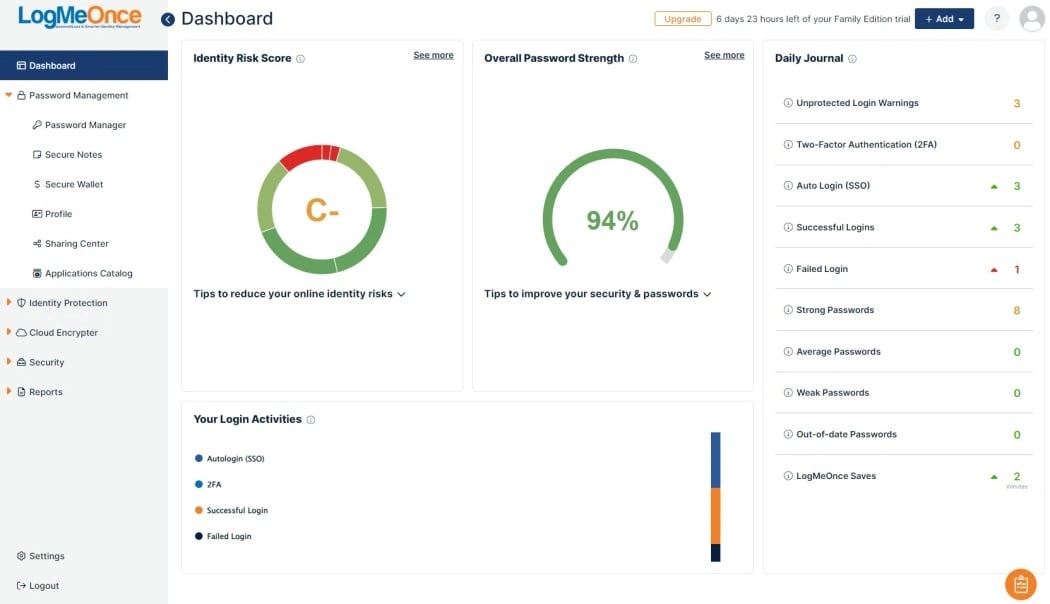
Image Source: PCMag
Cost factors often tip the scales when choosing between comparable password managers like 1Password and Enpass. Their pricing models reflect distinct philosophies about security and accessibility.
Free vs Paid Plans: Enpass Free Mobile vs 1Password Trial
Regarding free options, 1Password provides only a 14-day free trial with no permanent free tier. Enpass, alternatively, offers a genuinely free desktop version with full functionality except for data breach monitoring. Nevertheless, the free mobile version restricts users to just 25 passwords, potentially limiting its usefulness for smartphone-centric users.
One-Time Purchase vs Subscription: Lifetime vs Monthly
A fundamental difference emerges in their long-term payment models. 1Password operates exclusively on subscription-based pricing, starting at $1.50/month for individuals (billed annually). Conversely, Enpass offers both subscription options and a lifetime license—a one-time payment of $79.99-$99.99 grants permanent access to all current and future updates. For budget-conscious users who dislike recurring charges, this represents a significant advantage.
Family and Business Plans: Cost per User Comparison
For households, Enpass offers a more economical Family plan at $2.39/month for up to 6 users (billed annually), working out to approximately $0.40 per user monthly. 1Password’s Family plan costs $2.50/month for 5 users, or about $0.50 per user monthly.
Business users face a similar pattern: Enpass Standard plan costs $2.99/month per user, whereas 1Password’s Business plan runs $7.99/month per user. Consequently, Enpass typically represents the more affordable option across most use cases.
Storage Limits: 1GB Cloud Storage vs Local-Only Access
Storage capabilities vary considerably between platforms. 1Password includes 1GB of encrypted file storage for personal/family users and 5GB for business subscribers. Each stored file must remain under 2GB in size. Enpass, given its local-storage approach, uses your device’s existing storage capacity rather than providing cloud space. This difference reflects their contrasting philosophies—1Password’s cloud-centric versus Enpass’s privacy-focused local storage approach.
In the value calculation, Enpass typically costs less upfront and long-term across all plans, making it financially attractive for budget-conscious users who don’t require advanced features like emergency access.
Customer Support and Community Resources
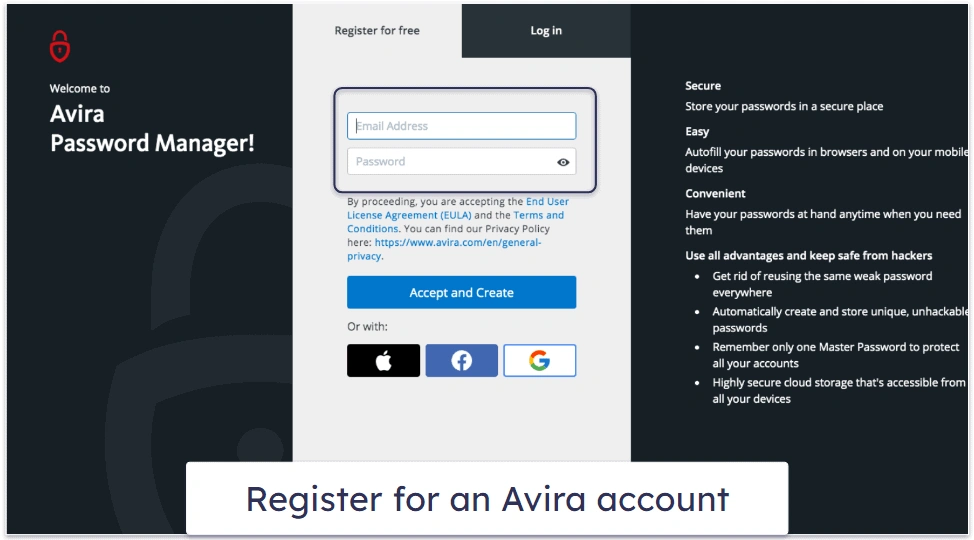
Image Source: SafetyDetectives
Reliable customer assistance often becomes the deciding factor when technical issues arise with password managers.
Support Channels: Live Chat vs Email and Phone
1Password offers a more comprehensive support system with email, live chat, and phone assistance. Enpass provides email and phone support as well, yet phone assistance is limited to 11AM-6PM India time, creating potential delays depending on your timezone. Users seeking immediate help may prefer 1Password’s more accessible support options.
Knowledge Base and Forums: Self-Help Resources
Both password managers maintain extensive self-service resources. 1Password features detailed how-to guides, step-by-step instructions, and comprehensive articles addressing common issues. Likewise, Enpass provides an extensive collection of user guides and FAQs. Both companies host active community forums where users can find solutions through peer assistance, with 1Password’s community particularly noted for having helpful members.
User Feedback and Ratings: What Real Users Say
According to G2 ratings, 1Password’s support quality scores 9.1 out of 10, outperforming Enpass’s 8.6 rating. Undoubtedly, this difference reflects real-world user experiences. Various customer reports indicate inconsistent experiences with Enpass support, occasionally described as less than satisfactory, whereas 1Password generally receives positive feedback regarding acceptable response times.
Comparison Table
| Feature | 1Password | Enpass |
| Security | ||
| Encryption | AES-GCM-256 with PBKDF2 | AES-256 with PBKDF2-HMAC-SHA512 |
| Additional Security | Secret Key (128-bit) | KeyFile feature |
| Multi-Factor Authentication | Yes (supports Authy, Google Authenticator, Duo) | No traditional MFA |
| Third-Party Audits | SOC 2 Type 2, ISO certifications | Cure53 audit |
| Core Features | ||
| Password Generator | Random passwords, passphrases, PINs | Random strings, passphrases |
| Password Sharing | Secure links with expiration settings | Pre-shared keys (PSK) |
| Account Recovery | Emergency Kit available | No recovery option |
| Travel Mode | Yes | No |
| Breach Monitoring | Yes (Watchtower) | Limited |
| Platform Support | ||
| Browser Extensions | Chrome, Firefox, Safari, Edge, Brave | Chrome, Firefox, Safari, Edge, Vivaldi |
| Mobile Apps | Full functionality | Limited to 25 items in free version |
| Sync Method | Cloud-based | Local storage or personal cloud services |
| Pricing (2025) | ||
| Free Version | 14-day trial only | Yes (limited on mobile) |
| Individual Plan | $1.50/month (billed annually) | One-time purchase ($79.99-$99.99) |
| Family Plan | $2.50/month (5 users) | $2.39/month (6 users) |
| Business Plan | $7.99/month per user | $2.99/month per user |
| Storage | 1GB cloud storage (5GB business) | Local device storage |
| Customer Support | ||
| Support Channels | Email, live chat, phone | Email, limited phone support |
| Knowledge Base | Comprehensive guides and articles | Extensive user guides and FAQs |
| Support Rating | 9.1/10 on G2 | 8.6/10 on G2 |
Conclusion
Ultimately, the choice between 1Password and Enpass depends largely on your specific security preferences, budget constraints, and feature requirements. Both password managers provide robust AES-256 encryption to safeguard your sensitive information, though their approaches differ significantly.
1Password stands out with its comprehensive security architecture, including the unique Secret Key system and advanced features like Travel Mode and Watchtower. Additionally, its extensive third-party validations (SOC 2 Type 2 and ISO certifications) demonstrate a strong commitment to security standards. However, this premium experience comes at a cost—1Password operates exclusively on a subscription model with no permanent free tier.
Enpass, conversely, appeals to budget-conscious users with its flexible pricing options, particularly the one-time purchase that eliminates recurring charges. Furthermore, its offline-first approach allows you to store data locally or sync through your preferred cloud service, offering greater control over your information. Nevertheless, Enpass has notable limitations, including restricted mobile functionality in the free version and less robust customer support.
From a platform perspective, both managers offer solid cross-platform compatibility across major operating systems and browsers. Still, 1Password generally delivers a more polished user experience with seamless synchronization, while Enpass prioritizes flexibility at the expense of some convenience.
The pricing difference remains perhaps the most compelling factor for many users. Enpass consistently offers more affordable options across individual, family, and business plans. Particularly, the lifetime license presents significant long-term savings compared to 1Password’s subscription-only model.
Before making your final decision, consider your personal priorities. If you value advanced security features, seamless cloud synchronization, and comprehensive support, 1Password justifies its premium pricing. Alternatively, if budget considerations, offline storage options, and customizable sync methods matter most to you, Enpass provides excellent value through its more flexible approach.
Regardless of which password manager you choose, both solutions significantly enhance your digital security compared to reusing passwords or storing them insecurely. The most important step is simply committing to a password manager that fits your needs and using it consistently across all your accounts.
FAQs
Q1. What are the top password manager options in 2025? The leading password managers in 2025 are 1Password and Bitwarden. Both offer robust security features, cross-platform compatibility, and user-friendly interfaces. 1Password is known for its advanced security architecture, while Bitwarden is praised for its open-source nature and flexibility.
Q2. How do 1Password and Enpass differ in their security approaches? 1Password uses AES-256 encryption with a unique Secret Key system for added protection. Enpass also employs AES-256 encryption but focuses on local storage and offline capabilities. 1Password offers more comprehensive third-party security audits, while Enpass provides flexibility in storage options.
Q3. What are the key features to look for in a password manager? Important features include strong encryption, multi-factor authentication, secure password generation, cross-platform sync, autofill capabilities, and breach monitoring. Additional valuable features may include password sharing, emergency access, and travel mode for enhanced security while traveling.
Q4. How do the pricing models of 1Password and Enpass compare? 1Password operates on a subscription-based model, starting at $1.50/month for individuals when billed annually. Enpass offers both subscription options and a one-time purchase lifetime license, which can be more cost-effective for users who prefer to avoid recurring charges.
Q5. Which password manager is better for families or businesses? Both 1Password and Enpass offer family and business plans. 1Password’s family plan costs $2.50/month for 5 users, while Enpass’s family plan is slightly cheaper at $2.39/month for 6 users. For businesses, 1Password provides more advanced features and integrations, but Enpass may be more budget-friendly for smaller teams.



